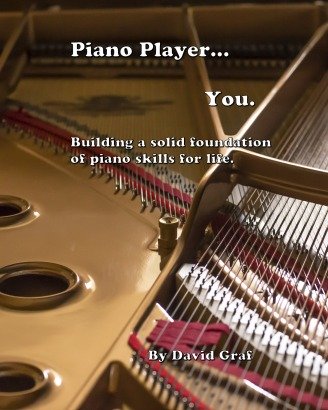The purpose of this website: helping you learn to play the piano. Building a strong foundation of piano-playing skills will lead to a lifetime of piano-playing joy.
The Piano Scale
A piano scale is a thing of beauty. It will provide you with the notes you need for a melody, as well as the chords to support your melody.
More, the scale provides the pianist with a means to learning and mastering the instrument. By learning the notes, fingerings, and images of the scales, you can become intimately familiar with the layout of the keys, both by feel and by sight.
The piano player must take every scale and learn the notes and the fingerings, committing both to memory and practicing until it flows naturally and easily, even at fast tempos.


Learn a scale slowly and hands-separately, just one or two octaves at a time. Putting the hands together feels completely different, so start slowly and work gradually faster. A fast piano technique will develop over a long period of time.
Learn all 12 major scales, all 12 melodic-minor scales, and all 12 harmonic-minor scales, and the piano keyboard will become yours. The image and feel of each scale provides a basis for learning music, writing music, reading music, and playing confidently.
For a more complete understanding of how to build your piano-playing foundation, read
For the most direct, organized, and progressive path to learning to play the piano, start
the Piano Skills Foundation series of piano lessons.
(Advertisement)
A Link To The Piano Scales:
All the scales and fingerings a pianist needs!
[The mastering of all major and minor scales will benefit your piano skills in countless ways. Your knowledge of keyboard geography and confidence in the feel and shape of each scale will help in reading and memorizing music, as well as understanding the structure of the music you play. Chords and chordal structures will make much more sense to you and you will see relationships and patterns which would not occur to you without proper knowledge of the scales. Also, your technique will grow and your ability to solve and master fingering issues will expand greatly. The pianist who has all the major and minor scales firmly in his head and in his hands will be much more confident and comfortable with all areas of piano playing then one who does not. So master the scales... all of them. Learn the fingerings for all, develop speed and dexterity using the metronome, rhythms and links. Play the scales in octaves, play the scales in thirds, in sixths, in tenths. Play them hands-separately, hands-together. Play them parallel and in contrary motion. Play them loud, play them soft, play them with musical shaping and touch. Play them in your pajamas, play them in your work clothes, play them in your football uniform... Play them, play them, play them. Oh yeah... don't forget to enjoy them! Scales can be lots of fun. You should never be bored when the scales are on your mind and in your fingers.]
Octave Scales
You will also want to incorporate octave scales into your practice routine.
-click here to learn about octave scales-
-click here for more about scales-

If you want to see a blueprint for a successful piano journey...
read
"Piano Player... You"
A guide to building a solid and complete piano-playing foundation.
-Click here to learn more about this e-book-
If you would like a step-by-step guide to help you on your piano journey...
start working through
"The Piano Skills Foundation" piano lessons
-Click here to learn more about this piano course-
Go From "Piano Scale" to "Free Piano Lessons"
Looking for some piano music?
I have found Sheet Music Plus to be a fantastic resource for piano books & other materials. And they have instant digital downloads for thousands of individual pieces.
3 Ways To Support This Website
If you enjoy using true-piano-lessons.com and would like to help support it:
1. Buy the ebook, "Piano Player... You"
2. Purchase "Piano Skills Foundation"
3.Donation
